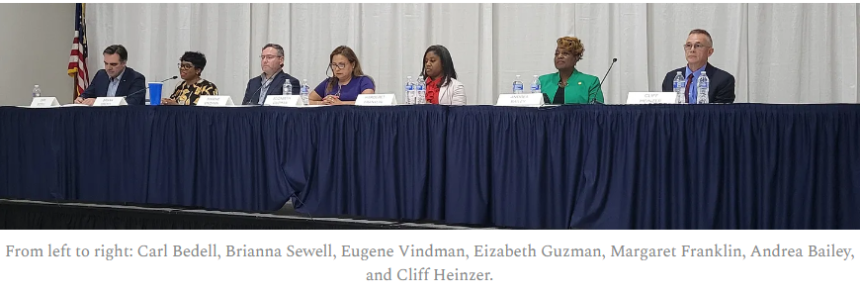
Candidates reveal few differences between themselves in a friendly public forum.
Congressional District 7’s out-going representative, Abigail Spanberger, isn’t on the ballot for this year’s primary. But her presence hung heavy over the candidate’s forum held in Fredericksburg Wednesday night.
After each of the seven candidates’ opening statements, the first question placed the congresswoman front and center for the evening when Carl Bedell and Brianna Sewell were asked which of Spanberger’s policy positions they would likely support should they win office.
Both candidates were willing to line up behind Spanberger.
Each committed themselves to continuing delivering excellent constituent services. Bedell then referenced the Problem-Solvers conference, of which Spanberger is a leader, and ensuring that Social Security remains viable. He also stressed his understanding of the region’s rural areas, possibly alluding to Spanberger’s work on the Agriculture Department. Sewell referenced the congresswoman’s work on the drug crisis, prescription prices, and delivering for both veterans and the district’s rural communities.
But when asked which of Spanberger’s policies they disagreed with or would adjust, neither candidate would bite. A testimony to how popular Spanberger remains.
Bedell said he’s “not looking retrospectively” and isn’t digging “into her faults.” Sewell said, similarly, that Spanberger has done a good job of serving the district and traveling to every corner of it. Something Sewell herself would continue.
Because of the large number of candidates, not all seven got to answer those two questions. The format called for asking two candidates the same question, then allowing for a follow-up question, before moving on.
It proved a smart move by the event planners, as one can imagine the remaining five candidates likely doing the same dance as Bedell and Sewell.
As the moderators cycled through questions and follow-ups, candidates didn’t show a great deal of difference in their answers.
On legalizing marijuana at the federal level: Both Sewell and Eugene Vindman answered in the affirmative, citing a range of reasons to do so. Sewell noted lost tax revenue and the disproportionate impact on minorities who are put into the judiciary system on marijuana violations.
Vindman also talked about the impact drug laws have on minority communities, and his experience as a federal prosecutor. In that role he had to put soldiers out of the military who had served honorably, but had used the drug recreationally. He also argued marijuana is no more dangerous than alcohol.
On eliminating mandatory minimum sentence guidelines: Again both Sewell and Vindman concurred.
On how candidates would balance regulating social media and freedom of online expression: Vindman and Elizabeth Guzman defended Biden’s decision to ban TikTok. Vindman discussed the national security concerns the platform poses, while Guzman touched on that, as well as children’s mental health.
On gun regulations: Guzman and Margaret Franklin came out strong on tighter regulations around assault-style weapons, ghost guns, red-flag laws, background checks, and gun-show loopholes.
On the role the U.S. should play in ensuring peace and stability around the world: Andrea Bailey and Cliff Heinzer came out for embracing our role in the world as “power brokers” (Bailey) and not “disengaging” (Heinzer) from the world at large.
On the rising cost of college and student debt: Heinzer said that debt relief was insufficient to solve the problem because the cost of education is the “real issue.” Bedell talked about the high-interest rates on federally-backed college loans, and finding a way to cover the cost for those who serve the country.
The one moment in the evening that a bit of light opened up between candidates was when Franklin and Bailey were asked about federal budgets, and whether they would agree to forego their salaries in the event of a shutdown. Bailey said she would “absolutely support that.”
Franklin also supports the plan, but notes that the Congress is more diverse than ever and there are members who can’t support themselves without that pay. So it would be important to keep that in mind should that situation arise.
Early in a campaign of this magnitude, that the people on stage largely agreed is not unusual. Spanberger’s popularity is high, and the candidates’ bench is deep. All seven candidates have significant life, government, and personal experiences that will serve them well in this run for Congress.
Now is not the time for a tactical mistake.
None were made this evening. But the pressure is growing.





